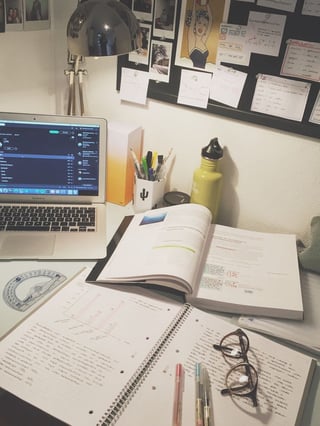 Few people like to do homework or study for a test. But it’s obviously important to do these things to perform well in school. And if you must engage in these activities, you might as well be as efficient and productive as possible. You want to get as much benefit from each hour you invest in studying as possible.
Few people like to do homework or study for a test. But it’s obviously important to do these things to perform well in school. And if you must engage in these activities, you might as well be as efficient and productive as possible. You want to get as much benefit from each hour you invest in studying as possible.
Improving Academic PerfORMANCE
Learn how to improve yourself through targeted learning and improved study skills.
Distracted? How to Develop a Focused Study Plan
So you want to learn how to study better and use your time wisely and effectively? You’ve got your books, pen, paper, computer, and mind to dig in for a solid chunk of time and maximize your study period? Well, think of it like exercise. Have you ever gone for a run? The first ten to fifteen minutes can be a real pain, can’t they? But once you get into the rhythm of it and your lungs and muscles are warmed up, it starts to flow. It starts to feel great. It even starts to be fun! And the payoffs are numerous.
How to Boost Your Reading Comprehension
 Reading comprehension is one of those critical skills that you use on a daily basis. Many may think that simply reading will help strengthen their reading comprehension skills, but that isn’t necessarily true. Reading comprehension goes beyond reading and understanding the words that make up a sentence. Reading comprehension involves deciphering the topic and purpose of the sentence, paragraph, or article at hand. Without reading actively -- that is reading, remembering, and analyzing what you’ve read -- your reading comprehension skills won’t improve very much. So, how can you learn to read actively? Take a look at the tips and strategies listed below to learn how to read actively.
Reading comprehension is one of those critical skills that you use on a daily basis. Many may think that simply reading will help strengthen their reading comprehension skills, but that isn’t necessarily true. Reading comprehension goes beyond reading and understanding the words that make up a sentence. Reading comprehension involves deciphering the topic and purpose of the sentence, paragraph, or article at hand. Without reading actively -- that is reading, remembering, and analyzing what you’ve read -- your reading comprehension skills won’t improve very much. So, how can you learn to read actively? Take a look at the tips and strategies listed below to learn how to read actively.
The Classes That Scare You: Developing growth mindset around challenging subjects
 We all have those pesky negative beliefs around certain subjects or classes at school: I’m a bad writer! I’ll never understand math! Learning a foreign language is impossible! Though certain classes may be more challenging than others, clinging to negative generalities about anything, especially education, doesn’t serve us.
We all have those pesky negative beliefs around certain subjects or classes at school: I’m a bad writer! I’ll never understand math! Learning a foreign language is impossible! Though certain classes may be more challenging than others, clinging to negative generalities about anything, especially education, doesn’t serve us.
Focused Training: The Key to Building Academic Skills and Improving your IQ
 Over the past few years I’ve been doing a lot of reading, and a fair amount of writing on this blog, around what truly drives academic performance. One of my favorite (and most important) insights has been that IQ, or natural intelligence, is far less important than people assume it to be. This article considers that insight from a different angle, and introduces an interesting new book about how it may be possible to improve your IQ through targeted training.
Over the past few years I’ve been doing a lot of reading, and a fair amount of writing on this blog, around what truly drives academic performance. One of my favorite (and most important) insights has been that IQ, or natural intelligence, is far less important than people assume it to be. This article considers that insight from a different angle, and introduces an interesting new book about how it may be possible to improve your IQ through targeted training.
Four Things Students and Tutors Should do AFTER an Initial Tutoring Session
As we’ve mentioned, there are many things you can do before the initial tutoring session to get the most out of tutoring. After you have attended your initial tutoring session, there are a few things you should do to ensure that you retain all the information you reviewed. In this blog article, we will discuss four things you should do after the initial tutoring session.
Write Summary Notes
It can be hard to absorb the lesson content or test-taking strategies your tutor is reviewing while also taking copious notes on the session material during a tutoring session. Because multi-tasking during a tutoring session may take away from you absorbing important material or test-taking strategies, I would recommend focusing on the lesson content during the tutoring session. After you’ve completed your initial tutoring session, be sure to take time to write down notes about test-taking strategies, content knowledge, and tips that your tutor reviewed during the session when everything is still fresh in your head. In fact, as Dr. Barbara Oakley teaches in her popular MOOC “Learning How to Learn: Powerful Mental Tools to Help You Master Tough Subjects,” summarizing in your own words is a powerful strategy for learning new things in general. You are more likely to retain information by summarizing lesson content or test-taking strategies in your own words, than if you copy things down word for word.
Practice, Practice, Practice!
The age-old adage that there is no better way to absorb, retain, and excel at something than to practice at it as much as possible still holds true today. It may be the case that you quickly understood new content that your tutor reviewed with you. Or perhaps, you were able to quickly absorb and apply a new concept or strategy in your session. Even so, you should still take time to continue practicing using the new strategies or content that you just gained in order to commit it to your memory. Some ways that you can practice using a new test-taking strategy is to complete practice problems on a practice exam. To commit new content knowledge to your memory, try writing out or summarizing the content knowledge, drawing diagrams, or teaching it to someone else. Make sure that you are engaging in “deliberate practice” when completing practice problems. Taking time to focus deeply on what you are doing, why each step matters, and when and how you are making mistakes, is far more powerful than rote repetition, as noted by the American Psychological Association. Practice new strategies/content knowledge regularly, preferably on a weekly basis until you are completely comfortable with it.
Review
In order to retain new and old test-taking strategies and content, it is important to review them regularly. Set aside a few minutes a day, or 30 minutes each week to review test-taking strategies and content. Additionally, prior to each tutoring session, take time to review strategies and content so that it’s fresh in your mind during each tutoring session. This will make tutoring sessions flow smoothly, as you can dedicate more time to building on concepts and strategies, rather than spending a chunk of time reviewing strategies and content that you covered in previous tutoring sessions.
Complete Homework for the Week
It is important to come prepared to each tutoring session, ready to learn new content and strategies. In order to do so, make time to complete any homework assignments or practice problems that your tutor assigned you. If you are having difficulty with the assignment, make sure to jot down your questions and ask your tutor about them during your next tutoring session.
Taking the time to complete these four simple tasks after each tutoring session will help to improve your retention of new strategies and content, as well as improve your test scores and academic performance.
